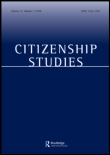Politics and enlightenment: Kant and Derrida on cosmopolitan responsibility
Ross Abbinnett
Citizenship Studies, Volume 2, Number 2, 1998, pages 197-222
Abstract
Abstract
Walter Benjamin once remarked of the enterprise of translation ‘that it is nowhere’: that the labour of transcribing the sense, inflection and difference of any particular language and text must always situate the translator in a space which is neither ‘of the original, nor ‘of the language into which it is to be transcribed. This ‘non‐position’ of the translator—between the original and its analogue, between the ‘spirit’ and the ‘letter’, the difference and the acceptability of the text—marks the labour of translation as an ethical responsibility: that of communicating the significance of something—a gesture, a story, a custom, a tradition—which has appeared to this/our socio‐linguistic culture as strange and unfathomably alien; and to achieve this communication without annulling its strangeness, its alterity. The purpose of my comparison of Kant and Derrida’s remarks on cosmopolitical responsibility therefore, is fourfold. First, I want to suggest that it is this ‘stricture’ of translation—this difficult responsibility of both judging and respecting the difference of foreign’ cultures—which marks the (non‐Kantian, non‐situated) ‘territory’ of cosmopolitical responsibility. Second, by using Kant’s remarks on the relationship between the political evolution of European Enlightenment culture and a possible world confederation of sovereign states, I want to point up the hierarchies and secondarizations involved in the determination of universal standards of moral, ethical and political conduct (even if these standards are originally prosecuted as the legislative conditions of a ‘radical democracy’). Third, I want to look at the ways in which the stricture of translation has been articulated as a theory of ‘global’ responsibility—particularly in the divergent ethical and political approaches of Jurgen Habermas and Jean‐Francois Lyotard. Fourth, I want to suggest that it is Derrida’s idea of a ‘dual responsibility’ of critical thought to the political and philosophical resources of European Enlightenment and to the difference of non‐European nations and cultures, that marks the difficulty (the stricture) of acting responsibly within the global economics of power, identity and legislation. I want, in other words, to show that the ‘nowhere’ of Benjamin’s translator, is a ‘place’ whose possibility demands a certain ‘Kantian’ right of reflection; that is, the right to pursue the ‘transcendent’ principle of respect for the other.
http://www.tandfonline.com/doi/abs/10.1080/13621029808420679
